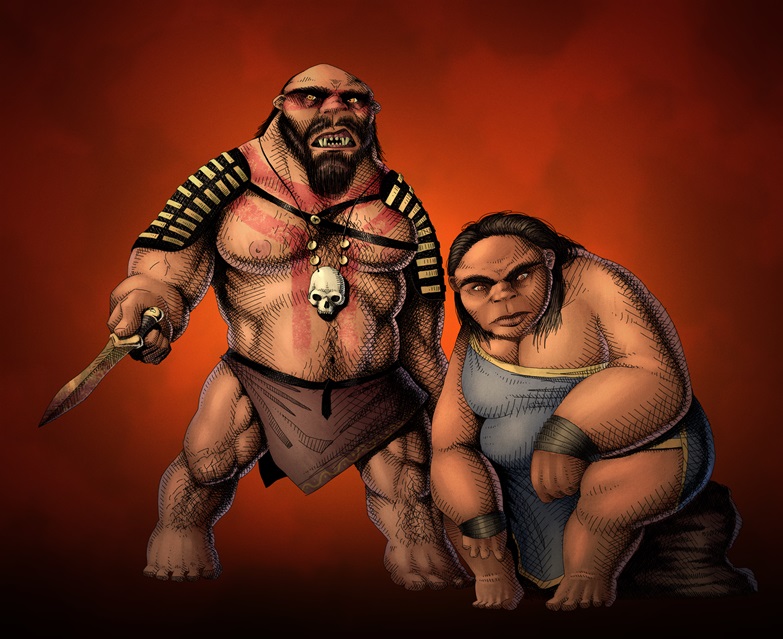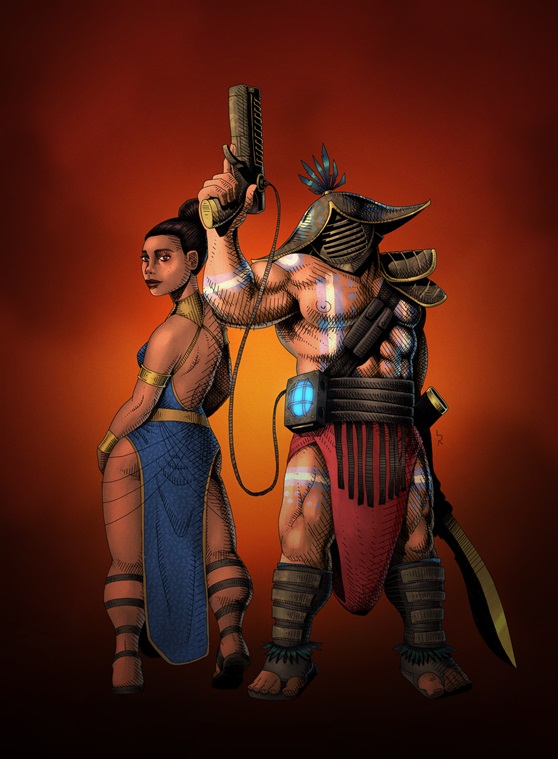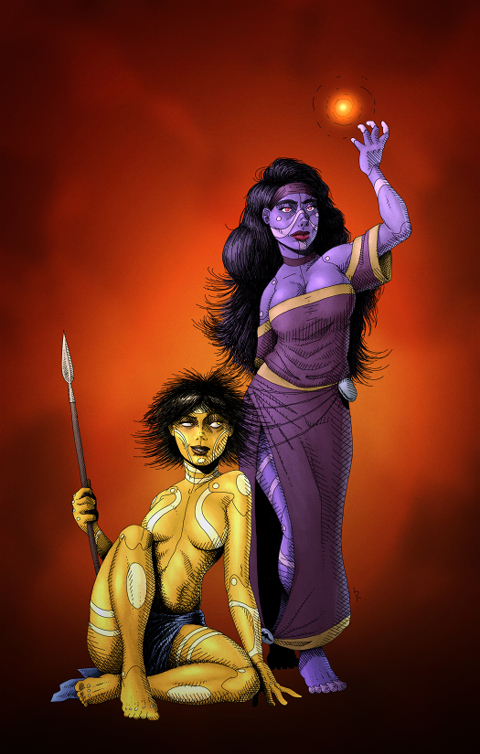
It is said that the first gigante was born to a chieftain of ancient times. This chieftain wanted a strong son to one day defeat his tribe's enemies who had caused them much suffering, but could not conceive a child even after trying with many women other than his wife. Eventually he sacrificed a dragon to the goddess Phylite to achieve his goal. For the generous offering Phylite granted the chieftain a strong son, but for the crime of adultery she caused the son to grow beastly, ugly and stupid. It is thought that all gigante are descendents of this child.
Gigantes are very similar to humans in many aspects, but stand approximately twice as tall. They usually live in nomadic clans or small tribes and rarely build permanent structures. The only major exceptions are their cultural sites known as tumuli.
A tumulus is a mound where gigantes bury their honored dead, and may also feature many large (although crude by human standards) sculptures of gods and heroes. They also serve as places for gigantes to gather for important events such as religious celebrations, marriages, or diplomatic discussions.
Most of the interactions gigantes have with humans are with human hill tribes, who occupy much of the same territory. Diplomacy and trade between hill tribes and gigante tribes are not significantly different from the inter-tribal dealings of gigantes, though humans usually view the gigante as being significantly less intelligent and more dangerous than themselves.
Gigantes can also be found frequently involved with settled humans. They are highly prized as gladiators and mercenaries, and many gigantes are lured by the potential wealth and luxury such a life can provide. Others may choose to integrate with human society simply to exercise their physical superiority over the weaker humans. Gigantes also make excellent slaves for humans, provided the humans are capable of controlling them.

Of all the rational creatures of Margos, humans are by far the most numerous and politically powerful. Like many other rational creatures humans live in small tribes all throughout the land. Unlike the others however they also build massive cities and command powerful nations.
The largest three nations of Margos are the Herachaean League, the Republic of Eron, and Rasnia. These nations control the majority of Margos’ most valuable land, leaving less hospitable areas to the wild hill tribes or nomadic Drephians.
Because of the power of humans, most other rational beings adopt many aspects of the culture of their nearest human neighbors. Humans are able to produce the most advanced items and goods, and can produce them in great numbers, meaning any non-human will most likely need to interact with humans to gain access to these resources.
In the eyes of most humans, they have proven their race as the masters of this world, second only to the gods.

Nymphs are a reclusive, all-female species. They usually live in tribes far from human civilization, most often near a source of the precious substance known as ambrosia. Many tribes hoard the ambrosia to themselves, but in some cases they are willing to trade some to outsiders for valuable resources.
Nymphs are easily distinguished from humans by their strangely colored skin, as well as the grooves and patterns that decorate it. These features are all present from birth. Most nymphs within a tribe will have similar coloration except when a nymph from another tribe is accepted as one of their own, or in the rare cases when a nymph is born with a coloration very different from the tribe that sired them.
Because every nymph is female, they cannot propagate themselves through normal means. The rarest way a nymph is born is through the will of the gods, when one is born without warning to a human woman. More often a nymph tribe will choose a human surrogate for their children. Nymphs create a special mixture of ambrosia and their own blood, which they feed to a human woman throughout the course of their pregnancy. If the ritual is performed correctly the child will be born as a nymph.
Nymph tribes are reclusive, sometimes to the point of xenophobia, and violence and tensions with outsiders are common. Despite this, nymphs are seen by the herachaeic religions as being favored by the gods and having a special connection to them (this is thought to be the source of their strange powers). For this reason families will sometimes volunteer to have children for a nymph tribe. This serves to foster friendly relationships between their community and the nymph’s, as well as please the gods. Offering a child to the nymphs is a common tactic for avoiding or mitigating tragedies such as diseases, war, or natural disasters.
In other cases nymphs may feed a pregnant woman their birthing substance secretly, or kidnap the woman and force her to consume it. When the nymph is born she is taken by force in these circumstances. The nymph’s reputation as child-thieves is feared nearly as much as their ferocity and prowess in combat.
Large-scale warfare between nymph tribes and outsiders is rare, but conflict is common when they are defending their territory or conducting raids for resources. Although nymphs have limited numbers they often outclass their opponents due to the wide array of powers members of their race can be born with. Nymphs are famous for counting many natural magi and diviners among them, as well as often having physical traits such as strength or reflexes which can greatly exceed those of an ordinary human.